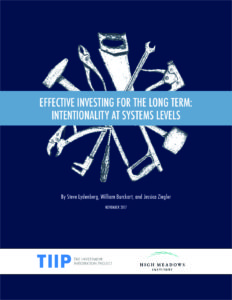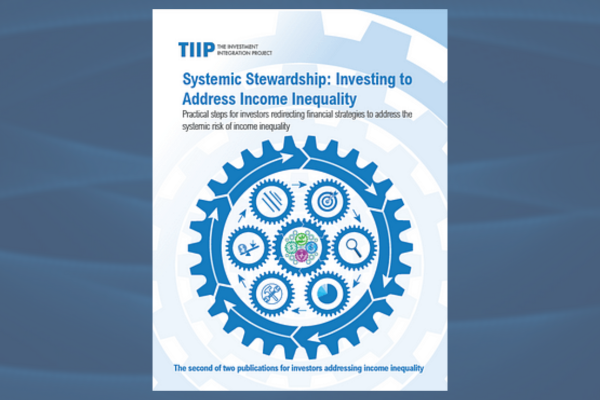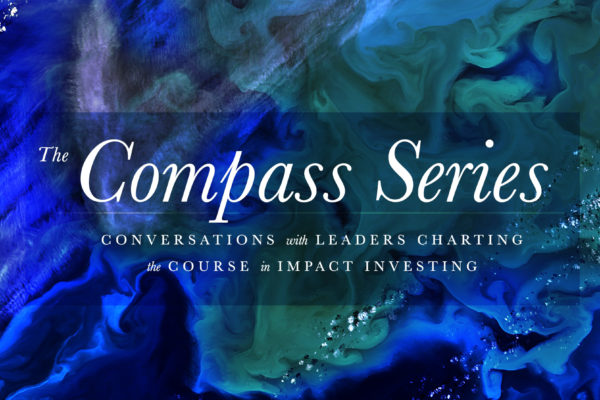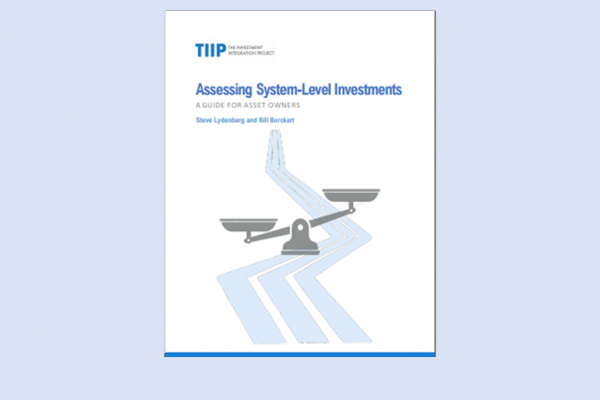 In this new report Effective Investing for the Long Term: Intentionality at Systems Level—written by Steve Lydenberg, William Burckart, and Jessica Ziegler—TIIP examines the strategies that more and more investors are utilizing to act with intentionality to balance efficiency in maximizing self-interested returns with maintaining the resilience of the environmental societal, and financial systems that are the ultimate source of this wealth creation. [Note: an earlier “exposure draft” of this report was released on July 12 to attendees of TIIP’s event with the Center for Applied Research (CAR) at State Street, in conjunction with Ceres.]
In this new report Effective Investing for the Long Term: Intentionality at Systems Level—written by Steve Lydenberg, William Burckart, and Jessica Ziegler—TIIP examines the strategies that more and more investors are utilizing to act with intentionality to balance efficiency in maximizing self-interested returns with maintaining the resilience of the environmental societal, and financial systems that are the ultimate source of this wealth creation. [Note: an earlier “exposure draft” of this report was released on July 12 to attendees of TIIP’s event with the Center for Applied Research (CAR) at State Street, in conjunction with Ceres.]
From the Executive Summary of the Report:
Long-term investors can benefit from broad-based market performance as well as from outperforming those markets. Such outperformance is often referred to “alpha” and because alpha is ultimately a zero-sum game, it is difficult for investors to attain consistently—and by definition impossible for all to do so at any one time. Nevertheless, all can benefit when financial markets perform well. Indeed studies have shown that asset allocation decisions account for a greater proportion of investors’ returns than do decisions of individual stock selection.
The question of whether investors have an impact, either positive or negative, on these markets—and on the foundational environmental, societal and financial systems upon which these markets are built— is therefore an important one.
That an increasing number of investors are concerned about short-termism in the financial markets and wish to see longer-term practices predominate is one indication of a desire for investment techniques that can help preserve and create value at these market, or systems, levels. Consequently, more and more investors now integrate environmental, social and governance (ESG) factors into investment management, both as a tool for potential alpha generation and to minimize market-level, and consequently systems-level, risks and maximizing their rewards.
For that reason, considerations of long-term value creation are increasingly directing investors’ attention to policies and practices effective in the preserving and enhancing these basic systems.
This report examines the potential of what we call “tools of intentionality” to facilitate effective impact by investors at these levels and by implication to increase the opportunities for enhancing overall market performance.
The report also addresses the question of why institutional investors are taking up such tools in a variety of ways at this moment in the history of finance. It hypothesizes that the complexity and interconnectedness of the world today has made all investors—and particularly long-term investors—dependent on globally interrelated environmental, societal and financial systems in a way qualitatively different from in previous recent history. Fundamental evolutions in demographics, technologies, communications and the global environmental are driving finance to reflect these changes in practice. Since these changes are creating an interconnected and interdependent world of the current century fundamentally different from that of the previous century, it is not surprising that these changes in finance should also be fundamental, at least in certain regards.
One aspect of these changes lies in the increasing momentum behind long-term institutional investors’ intentional decisions to acknowledge and act upon their ability to effectively impact these environmental, societal and financial systems, while still managing their portfolios efficiently.
Check out a webinar co-hosted by TIIP and the Intentional Endowments Network (IEN) during which we reviewed key findings:



